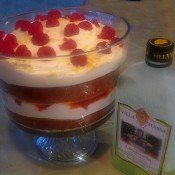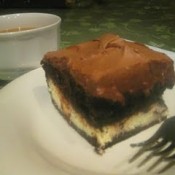Cooking with Limoncello

Out with the old, and in with the new. Not only is that my motto for New Years resolutions and spring cleaning, it also applies to my annual limoncello bottling! Every year at this time I start the bottling process of my home made ‘cello (fondly called Domenicello) that has been sitting in a large mason jar, infusing in a dark basement cabinet for the better part of three months. Not that any of last year’s batch goes to waste. It’s all good to the last drop! But with the new annual batch ready to be poured (this year I went with orangecello), I tend to look for ways to help use up whatever is left of the previous year’s batch…and, of course to help make room in the freezer for the newbies.
Limoncello (or whatever other flavor ‘cello that you prefer) is traditionally used as either a palate cleanser before your meal or as an after dinner digestivo to help your system digest your meals. It has also become a key ingredient in trendy cocktails as of late. But did you know that you can also include limoncello in many different food recipes? From appetizer to dessert, limoncello can be incorporated in recipes that traditionally use lemon juice.
When using limoncello in a recipe, the first steps that you need to figure out is how you plan to use it and to what crowd you are serving it. Limoncello is, of course, an alcohol-based liqueur. Serving it straight up, preferably chilled, over vanilla ice cream or chopped fruits will add a nice lemony zing, but keep in mind that these dishes should only be served to grown-ups. If you’re looking to incorporate it in a chilled dish for a mixed crowd, you can first simmer the ‘cello in a sauce pan to burn off the alcohol until it reduces into a syrup. You can then drizzle the chilled (but not frozen) syrup over fruits and berries or incorporate it in a cake or as a drizzled icing. Both the straight and reduced versions make for great additions to seafood and chicken marinades (again, depending on your crowd). If you are heating limoncello, say in a sauce or as a demi-glace, the alcohol will burn off.
While doing my research, I found some really interesting recipes that use limoncello, such as risotto, gelato, tiramisu, and various cakes and cookies (many of the recipes and all other things limoncello-related can be found at limoncelloquest.com). I’ve decided to try two dishes this week that will use limoncello as an ingredient.
First up is Limoncello Shrimp. I had the idea in mind as an appetizer and found what looks to be the perfect recipe at crostiniandchianti.blogspot.com. It incorporates all of the key ingredients that I would use, so why re-invent the wheel? Well, I gotta tell you…this recipe blew me away. It was very easy, quick and made one of the tastiest shrimp dishes that I ever had. This definitely ranks as one of my all time favorite appetizers.





Recent Comments